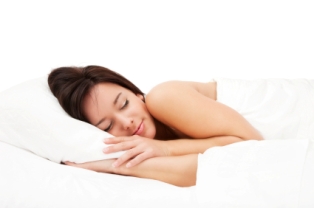Gaining More Sleep by Losing Weight
Study:Â Sleep Apnea Episodes Halved through Weight Loss

British Medical Journal reports on the significant tie between diminishing sleep apnea episodes and losing weight.
All of us have trouble sleeping now and then. Whether it’s due to stress, an uncomfortable bed, thoughts you can’t get out of your head, or a disturbing conversation where things were better left unsaid, common but frustrating experiences cause us to wake up several times a night.
But imagine waking up not several times a night, but hundreds of times a night. Because if you’re one of the approximately 20 million people in America with sleep apnea, this is your life in a nutshell.
Sleep apnea is different from other sleep conditions in that it seems like the person who has it is sleeping fine. In fact, at various point in the night, their sleep can be reminiscent of the dead – literally. They’ll stop breathing for minutes at a time, waking up gasping for breath.
If this sounds serious, it is. And if it sounds scary, it is. People have been known to die from sleep apnea.
Besides the obvious side effects associated with sleep apnea—like difficulty staying asleep, excessive sleepiness during the day because of the lack of sleep during the night—sleep apnea has long term health consequences as well. Because of the intermittent cessations in breathing, high blood pressure is a common trait. And with high blood pressure carries the added risks of stroke and heart disease.
Treatments for sleep apnea are both invasive and non-invasive, ranging from surgery on the nose or throat, oral appliances that allow for a greater airway passage or masks that open the nasal passages. And while these treatments have worked to varying degrees and extents, the most cost-effective way of treating sleep apnea may be to lose weight.
According to a study published in the British Medical Journal and conducted by researchers from the Karolinska Institute, people who lost weight cut their sleep apnea episodes almost in half compared to the control group.
Here’s how the study went down: All of the participants used a therapy that’s very commonly used in people with sleep apnea called Continuous Positive Airway Pressure, or CPAP. This is where a mask is placed over the nose during sleep which allows for a greater airflow (gentle, but greater), hopefully diminishing the snoring and breathing cessation episodes.
Both of the groups in the study used CPAP (pronounced see-pap), but only one of the groups went through an intense program that had them lose weight.
The researchers believe that the combination of CPAP and the participants’ rigorous weight loss program (an average of 41 pounds was lost) decreased the number of sleep apnea incidents. They really emphasized the importance of the weight loss because the drop in the number of incidents was so significant for the weight loss group compared to the CPAP-only group.
As propitious as these findings are, there are some limitations to how far they can be generalized to the population at large. For example, this is only the second study that’s addressed the link between weight and sleep apnea. And while both studies have found losing weight affects the incidence level of sleep apnea, this most recent study only looked at men (65 in total). Further, it was only done on people who were obese (i.e., a BMI index level over 30).
If you think you may have sleep apnea, there are some things you can do to self-diagnose. For example, people with sleep apnea almost always awake with a dry mouth, are excessively sleepy throughout the day (to the point of falling asleep at the dinner table) and have headaches upon awakening in the morning. If these symptoms sound familiar, have someone else observe you while you sleep to determine definitively if it is indeed sleep apnea. For example, have them see if you wake up excessively (at least 12 times); if you stop breathing for at least 10 seconds during each apnea episode; and count the number of episodes there are per hour (five or more is indicative of sleep apnea).
Sources:
Balch, Phyllis A. “Prescription for Nutritional Healing.” Fourth Ed. New York: Avery, 2006.
sciencedaily.com
mayoclinic.com
Related Posts
- Blood Pressures Rising Among Youth: Researchers Believe Lack of Sleep May Be to Blame
- Lack of Sleep a Nightmare for Blood Pressure
- Sleeping Habits Linked to Diabetes Risk, According to Study
- Why Sleep Needs the Goldilocks Treatment
- Young Have Little to Reap on No Sleep
 
|
Enjoy this article? We guarantee your privacy. Your email address will NEVER be rented, traded or sold. |
Visit my new site: Self Help On The Web
 |
 |
Posted: December 7th, 2009 under Sleep.
Tags: apnea treatment, sleep apnea diagnosis, sleep apnea symptoms, sleep apnea treatment






